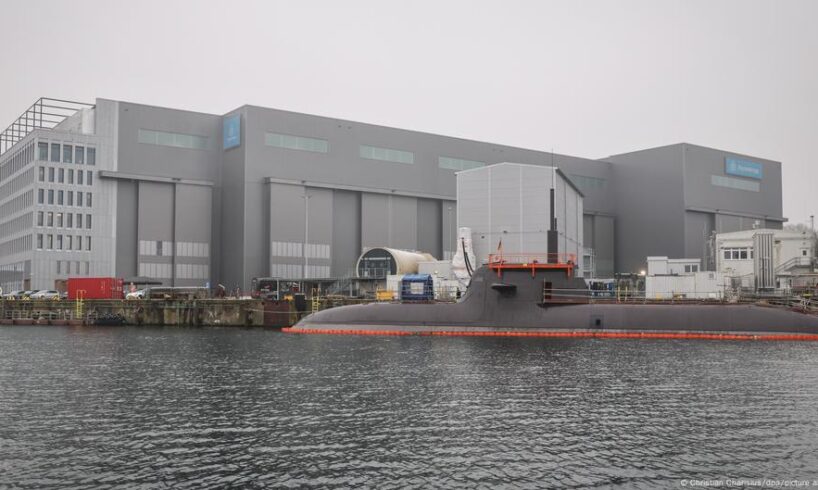
Rare earths are extremely valuable metallic elements that are not only found in smartphones and electric cars, but also in weapons. Among other things, they are used in the construction of fighter jets and submarines. In addition, rare earths are found in specially hardened ammunition and armored vehicles, in propulsion systems and sensor technology.
More than 400 kilos of rare earths are used in one F-35 stealth bomber alone.
The lion’s share of the rare earths processed in Germany comes from China, and this is precisely where the problem lies: As a result of the tariffs dispute with the US, Beijing announced at the beginning of October that it would once again drastically tighten its already strict export rules. China threatened to stop exporting rare earths needed for military purposes.
Rare earths — the new gold?
To view this video please enable JavaScript, and consider upgrading to a web browser that supports HTML5 video
Moreover, companies applying in China to export materials are now required to submit detailed information, some of which is confidential. For arms manufacturers in particular, this is simply out of the question. “The end-use clauses, the high bureaucratic hurdles and the access into supply planning are basically nothing but industrial espionage,” Jakob Kullik, political scientist at the Chemnitz University of Technology, told DW.
The Federation of German Industries (BDI) is also critical: “The new rules can be seen as a direct attack on the rearmament of the West,” it said in a statement. Recently, the German arms industry has massively ramped up production to equip the German armed forces, the Bundeswehr, with modern weapon systems. Providing continued support to Ukraine in the form of weapons is another reason for the arms buildup, which is likely to be a thorn in the side of Russia’s ally China.
German companies take precautions
How is the German defense industry responding? “There is no panic in the industry,” Hans Christoph Atzpodien, CEO of the German Security and Defense Industry Association (BDSV), told DW. Compared to other industries, Atzpodien pointed out, the defense industry uses “relatively small quantities” of rare earths. Furthermore, companies have taken precautions so that they will not have to restrict production in the coming months.
However, experts still see a real risk of supply bottlenecks. China controls around 80% of global production and over 90% of rare earth refining. “When push comes to shove, the big question is where defense companies will get alternatives, and things are looking really bleak in that regard,” emphasized Kullik, who studies the strategic importance of raw materials for military security.
Establishing alternatives to China would take many years, even if work began immediately. “We see an urgent need for action to make us more independent in Europe as a whole,” said Atzpodien. Europe must build up its own capacity to process rare earths. “This will require simplifying the relevant environmental permits.”
The battle for rare earths: How much power does China hold?
To view this video please enable JavaScript, and consider upgrading to a web browser that supports HTML5 video
A dirty and unprofitable business
Mining rare earths is difficult, dirty and expensive. The 17 chemical elements are not actually that rare in the Earth’s crust, but they only occur in very low concentrations. Large quantities of rock and ore must be mined to extract them, and chemicals are often needed to separate them.
The largest deposits are found in China, Vietnam, Brazil, Russia, Australia and Greenland, but also in the US.
However, due to the expense involved, mining is unprofitable for mining companies. This is why mines in the US and Australia have had to close down. China, on the other hand, recognized the importance of rare earths early on and expanded its mines, refineries and processing plants.
For the German government, but also for the German economy, it has always been easiest to rely on imports of rare earths. “In the past, we were happy to outsource processing to China, but that is no longer possible,” noted the German Security and Defense Industry Association.
As became evident in 2010, China’s quasi-monopoly has given it powerful geopolitical leverage. Due to a territorial dispute in the East China Sea, China temporarily stopped supplying Japan with rare earths. Ever since this wake-up call, Japan has significantly reduced its dependence on rare earths from China.
This is also the path currently being pursued by the US. President Donald Trump has used the last few months to secure sources of rare earths all over the world. But even the US cannot do without China: At a meeting in South Korea at the end of October, Trump agreed with Chinese President Xi Jinping that export restrictions on rare earths would be suspended, at least temporarily.
EU seeks to reduce dependencies amid US-China trade war
To view this video please enable JavaScript, and consider upgrading to a web browser that supports HTML5 video
Will mining make a comeback in Germany?
For years now, Germany has recognized that it would be safer to diversify its supply of critical raw materials. However, little has happened. “The government and industry are passing the buck back and forth,” observed Kullik. “The Economy Ministry has said, if industry doesn’t do anything, we won’t do anything either. And industry has said, if the situation is not dire, then we don’t need to stockpile supplies and we don’t need government intervention.”
So the question remains: Who will take responsibility for securing supplies from alternative sources? Who will take the risk and invest money in developing mines?
There are also rare earth deposits in Germany, for example, in the Ore Mountains in the eastern state of Saxony. But they are barely being explored. “We no longer have any large German mining companies with the expertise. That means that even if the federal government wanted to do it, even if it were to invest €10 billion ($11.5 billion) or more in the ideal case, the fact remains that we lack the necessary partners,” explained Kullik.
Although large German defense contractors assert that their supply is currently secure, China’s quasi-monopoly on rare earths gives it, as Kullik puts it, “the perfect geo-economic bargaining chip.” If China were to use this chip, it could at least complicate or delay the German military’s efforts to equip itself with modern weapons.
This article was originally written in German.





